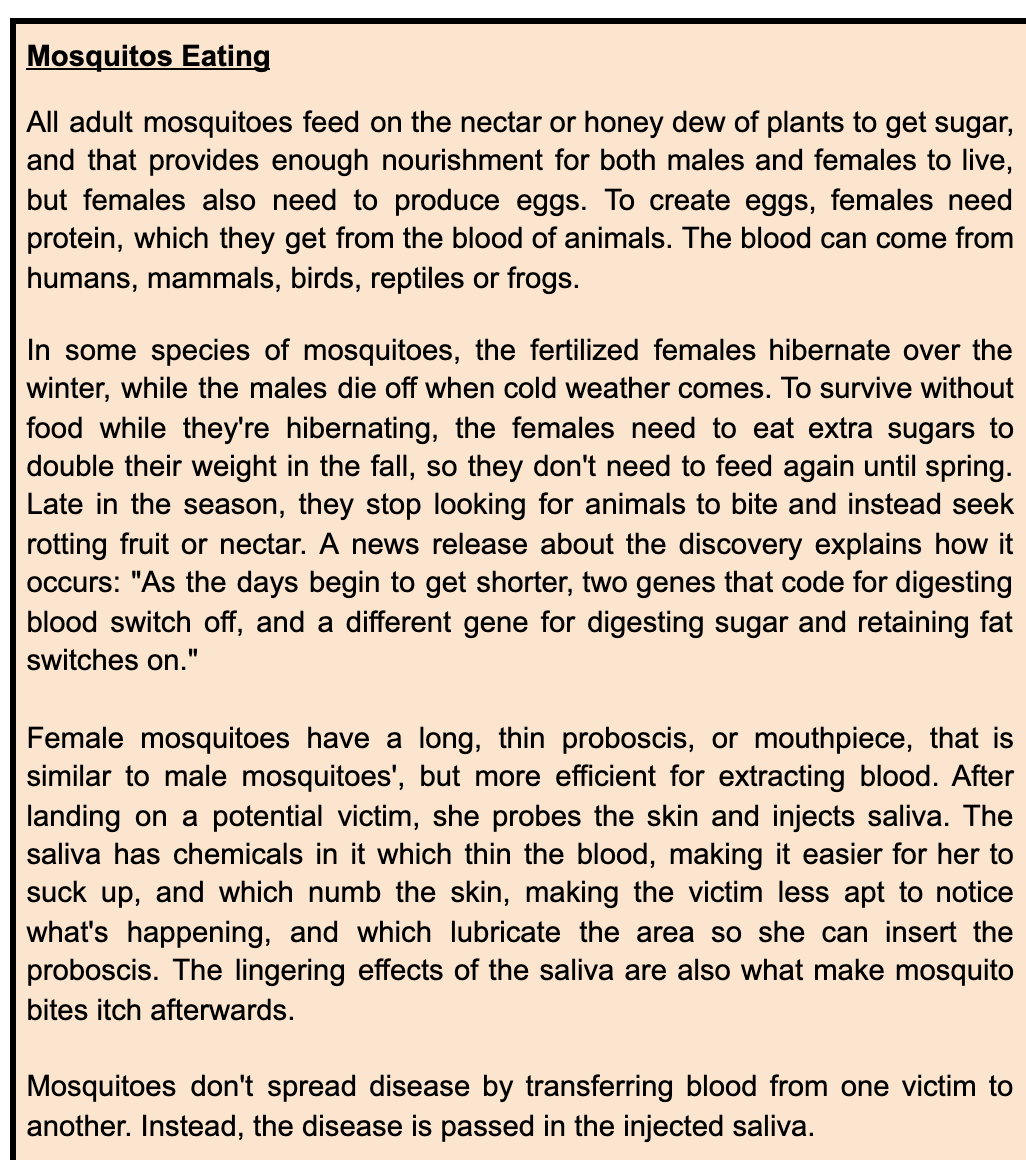Based on the text for mosquitoes eating: 1. Identify abiotic factors that support the survival and reproduction of the mosquitoes. 2. Identify biotic factors that support the survival and reproduction of the mosquitoes. 3. Predict what factors in the environment can be altered to decrease the survival and reproduction of the mosquities. PLEASE ANSWER BASED ON THE TEXT ONLY
Based on the text for mosquitoes eating: 1. Identify abiotic factors that support the survival and reproduction of the mosquitoes. 2. Identify biotic factors that support the survival and reproduction of the mosquitoes. 3. Predict what factors in the environment can be altered to decrease the survival and reproduction of the mosquities. PLEASE ANSWER BASED ON THE TEXT ONLY
Biology Today and Tomorrow without Physiology (MindTap Course List)
5th Edition
ISBN:9781305117396
Author:Cecie Starr, Christine Evers, Lisa Starr
Publisher:Cecie Starr, Christine Evers, Lisa Starr
Chapter15: Animal Evolution
Section: Chapter Questions
Problem 1DID
Related questions
Question
Based on the text for mosquitoes eating:
1. Identify abiotic factors that support the survival and reproduction of the mosquitoes.
2. Identify biotic factors that support the survival and reproduction of the mosquitoes.
3. Predict what factors in the environment can be altered to decrease the survival and reproduction of the mosquities.
PLEASE ANSWER BASED ON THE TEXT ONLY

Transcribed Image Text:Mosquitos Eating
All adult mosquitoes feed on the nectar or honey dew of plants to get sugar,
and that provides enough nourishment for both males and females to live,
but females also need to produce eggs. To create eggs, females need
protein, which they get from the blood of animals. The blood can come from
humans, mammals, birds, reptiles or frogs.
In some species of mosquitoes, the fertilized females hibernate over the
winter, while the males die off when cold weather comes. To survive without
food while they're hibernating, the females need to eat extra sugars to
double their weight in the fall, so they don't need to feed again until spring.
Late in the season, they stop looking for animals to bite and instead seek
rotting fruit or nectar. A news release about the discovery explains how it
occurs: "As the days begin to get shorter, two genes that code for digesting
blood switch off, and a different gene for digesting sugar and retaining fat
switches on."
Female mosquitoes have a long, thin proboscis, or mouthpiece, that is
similar to male mosquitoes', but more efficient for extracting blood. After
landing on a potential victim, she probes the skin and injects saliva. The
saliva has chemicals in it which thin the blood, making it easier for her to
suck up, and which numb the skin, making the victim less apt to notice
what's happening, and which lubricate the area so she can insert the
proboscis. The lingering effects of the saliva are also what make mosquito
bites itch afterwards.
Mosquitoes don't spread disease by transferring blood from one victim to
another. Instead, the disease is passed in the injected saliva.
Expert Solution
This question has been solved!
Explore an expertly crafted, step-by-step solution for a thorough understanding of key concepts.
Step by step
Solved in 2 steps

Knowledge Booster
Learn more about
Need a deep-dive on the concept behind this application? Look no further. Learn more about this topic, biology and related others by exploring similar questions and additional content below.Recommended textbooks for you

Biology Today and Tomorrow without Physiology (Mi…
Biology
ISBN:
9781305117396
Author:
Cecie Starr, Christine Evers, Lisa Starr
Publisher:
Cengage Learning

Biology: The Unity and Diversity of Life (MindTap…
Biology
ISBN:
9781337408332
Author:
Cecie Starr, Ralph Taggart, Christine Evers, Lisa Starr
Publisher:
Cengage Learning

Biology: The Unity and Diversity of Life (MindTap…
Biology
ISBN:
9781305073951
Author:
Cecie Starr, Ralph Taggart, Christine Evers, Lisa Starr
Publisher:
Cengage Learning

Biology Today and Tomorrow without Physiology (Mi…
Biology
ISBN:
9781305117396
Author:
Cecie Starr, Christine Evers, Lisa Starr
Publisher:
Cengage Learning

Biology: The Unity and Diversity of Life (MindTap…
Biology
ISBN:
9781337408332
Author:
Cecie Starr, Ralph Taggart, Christine Evers, Lisa Starr
Publisher:
Cengage Learning

Biology: The Unity and Diversity of Life (MindTap…
Biology
ISBN:
9781305073951
Author:
Cecie Starr, Ralph Taggart, Christine Evers, Lisa Starr
Publisher:
Cengage Learning


Biology: The Dynamic Science (MindTap Course List)
Biology
ISBN:
9781305389892
Author:
Peter J. Russell, Paul E. Hertz, Beverly McMillan
Publisher:
Cengage Learning
